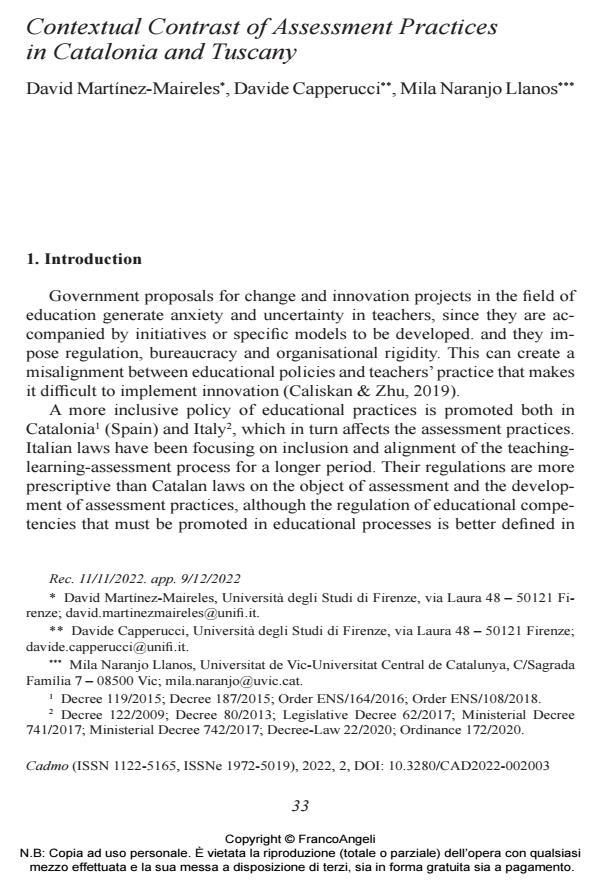Contextual Contrast of Assessment Practices in Catalonia and Tuscany
Journal title CADMO
Author/s David Martínez-Maireles, Davide Capperucci, Mila Naranjo Llanos
Publishing Year 2023 Issue 2022/2
Language English Pages 22 P. 33-54 File size 267 KB
DOI 10.3280/CAD2022-002003
DOI is like a bar code for intellectual property: to have more infomation
click here
Below, you can see the article first page
If you want to buy this article in PDF format, you can do it, following the instructions to buy download credits

FrancoAngeli is member of Publishers International Linking Association, Inc (PILA), a not-for-profit association which run the CrossRef service enabling links to and from online scholarly content.
Keywords: assessment practices, assessment planning, assessment innova- tion, student participation, assessment competence.
- Adachi, C,. HongMeng Tai, J. & Dawson, P. (2017), “Academics’ perceptions of the benefits and challenges of self and peer assessment in higher education”, Assessment and Evaluation in Higher Education, 43 (2), pp. 294-306, DOI: 10.1080/02602938.2017.1339775
- Analí, V., Paoloni, P.V., Donolo, D.S. (2017), “Creencias de autoeficacia y contextos de evaluación. Un estudio con estudiantes universitarios”, Revista actualidades investigativas en educación, 17 (2), pp. 112-143.
- Caliskan, A., Zhu, C. (2019), “Organizational culture and educational innovations in Turkish high education: perceptions and reactions of students”, Educational Sciences: Theory & Practice, 20 (1), pp. 20-39,
- Cizek, G.J., Kosh, A.E., Toutkoushian, E.K. (2018), “Gathering and evaluating va- lidity evidence: the generalized assessment alignment tool”, Journal of Educa- tional Measurement, 55 (4), pp. 477-512,
- Cornoldi, C., De Beni, R., Gruppo, M.T. (2020), Imparare a studiare: strategie, stili cog- nitivi, metacognizione e atteggiamenti nello studio. Trento: Centro Studi Erickson.
- Darmody, M., Lysaght, Z., O’Leary, M. (2020), “Irish postprimary teachers’ con- ceptions of assessment at a time of curriculum and assessment reform”, As- sessment in Education: Principles, Polixcy & Pratice, 27 (5), pp. 501-521, DOI: 10.1080/0969594X.2020.1761290
- Flores, M.A. (2012), “The implementation of a new policy on teacher appraisal in Por- tugal: how do teachers experience it at school?”, Educational Assessment Evalu- ation and Accountability, 24 (4), pp. 351-368,
- Folch, C., Córdoba, T., Ribalta, D. (2020), “La performance: Una propuesta interdis- ciplinar de las áreas de educación física, educación musical y educación visual y plástica en la formación inicial de los futuros maestros”, Retos, 37, pp. 613-619,
- Jiang, J.Y., Sporte, S.E., Luppescu, S. (2015), “Teacher perspectives on evaluation reform”, Educational Researcher, 44 (2), pp. 105-116, DOI: 10.3102/0013189X15575517
- KingSears, M.E., Strogilos, V. (2020), “An exploratory study of selfefficacy, school belongingness, and co-teaching perspectives from middle school students and teachers in a mathematics cotaught classroom”, International Journal of Inclusive Education, 24 (2), pp. 162-180, DOI: 10.1080/13603116.2018.1453553
- Koenen, A., Dochy, F., Berghmans, I. (2015), “A phenomenographic analysis of the implemetnation of competencebased education in higher education”, Teaching and Teacher Education, 50, pp. 1-12,
- Kraft, M.A., Gilmour, A.F. (2016), “Can principals promote teacher development as evaluators? A case study of principals’ views and experiences”, Educational Ad- ministration Quarterly, 52 (5), pp. 711-753, DOI: 10.1177/0013161X16653445
- Kulasegaram, K., Rangachari, P.K. (2018), “Beyond ‘formative’: assessments to enrich student learning”, Advanced in Phycology Education, 42, pp. 5-14,
- Li, L., Grion, V. (2019), “The power of giving feedback and receiving feedback in peer assessment”, All Ireland Journal of Higher Education, 11 (2), pp. 1-17.
- Lucisano, P., Stanzione, I. (2018), “Ripensare il successo scolastico a partire dal vis- suto degli studenti”, Ricercazione, 10 (2), pp. 79-100, DOI: 10.32076/RA10206
- Murillo, F.J., Duk, C. (2015), “Escuelas inclusivas: gestión para el cambio y la me- jora”, Diplomado en inclusión educativa escuelas inclusivas: enseñar y aprender en la diversidad, OEI-CAEU.
- OFSTED (2008), Assessment for learning: the impact of National Strategy support. OFSTED.
- Quesada, V., Rodríguez, G., Ibarra, M.S. (2013), “ActEval: un instrumento para el análisis y reflexión sobre la actividad evaluadora del profesorado universitario”, Re- vista de educación, 362, pp. 69-104, DOI: 10.4438/1988-592X-RE-2011-362-153
- Quesada, V., Rodríguez, G., Ibarra, M.S. (2017), “Planificación e innovación de la evaluación en educación superior: la perspectiva del profesorado”, Revista de investigación educativa, 35 (1), pp. 53-69,
- Solheim, K., Roland, P., Ertesvåg, S.K. (2018), “Teachers’perceptions of their col- lective and individual learning regarding classroom interaction”, Educational Research, 60 (4), pp. 459-477, DOI: 10.1080/00131881.2018.1533790
- Trinchero, R. (2017), “Nove concetti chiave per un’istruzione informata dall’evi denza”, Formazione & Insegnamento, 15 (2), pp. 113-125,
- Vannini, I. (2011), Dalla diagnosi in ingresso alla valutazione sommativa. Il control- lo degli apprendimenti per promuovere la cultura della valutazione all’interno delle scuole. In D. Capperucci (a cura di), La valutazione degli apprendimenti in ambito scolastico. Promuovere il successo formativo a partire dalla valutazione. Milano: FrancoAngeli, pp. 40-62.
David Martínez-Maireles, Davide Capperucci, Mila Naranjo Llanos, Contextual Contrast of Assessment Practices in Catalonia and Tuscany in "CADMO" 2/2022, pp 33-54, DOI: 10.3280/CAD2022-002003